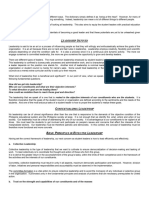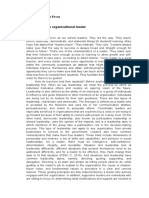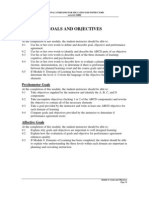Dio Module 6
Dio Module 6
Uploaded by
lorkishopsCopyright:
Available Formats
Dio Module 6
Dio Module 6
Uploaded by
lorkishopsCopyright
Available Formats
Share this document
Did you find this document useful?
Is this content inappropriate?
Copyright:
Available Formats
Dio Module 6
Dio Module 6
Uploaded by
lorkishopsCopyright:
Available Formats
Name: Obsanga, Yuleen Aaron M.
CWTS
Program/Section: BSIT-1A Name of Facilitator: Ma'am Nimfa Bautista
MODULE 6: LEADERSHIP
LEARNING OBJECTIVES
At the end of this section, the student should be able to:
1. Discuss the meaning of leadership.
2. Describe the leadership types and their characteristics.
3. Assess student's personal leadership level. 4. Explain the qualities of a good leader.
OVERVIEW
"Leaders are made, they are not born. They are made by hard effort, which is the price
which all of us must pay to achieve any goal that is worthwhile" -Vince Lombardi
Everyone was born with abilities, skills, and intelligences which are prerequisite in
leading people or an organization. With such endowed gifts of life, no one is left behind-
everyone could be productive and has a chance to be a leader.
Who is a leader?
A person who is able to influence others to achieve the common goals.
A person who serves as the forerunner of the group, who spearheads the actions of the
group towards the accomplishment of the desired outcome.
A person who guides, inspires, and motivates people in the group to pursue what has
started for the common good of everyone.
Leaders create impact in the society. There are bad and good leaders. History tells us
the influence and impact of these leaders. Regardless of what type a leader is, we learn from
them.
LEARNING ACTIVITY 2
Understanding Leadership Style
If you were given a chance to lead a group, what leadership style would you like to use and why?
I would choose Servant Leadership because it’s about putting others first and helping
them grow. This style makes sure team members feel valued, empowered, and heard.
It’s about working together, sharing ideas, and being open with each other. Servant
leaders also care about doing the right thing and making a positive impact. I like this
style because it builds trust, respect, and teamwork. It helps others become leaders too,
and everyone learns from mistakes. As a servant leader, I would listen carefully, guide
and support my team, celebrate successes, and lead by example. I believe this style is
important because it puts people and purpose before power and control, making our
team strong and happy.
LEARNING ACTIVITY 3: More on Leadership
My Model Leader
Among the well-known leaders in the world, choose a leader (one international, one
local) whom do you think is a model leader. Why do you consider them as role model in
leadership? What makes their leadership effective? What are their personality traits,
characteristics, and positive habits?
My international model leader is Mahatma Gandhi, who demonstrated exceptional
leadership through his unwavering commitment to non-violent civil disobedience. He inspired
hope and unity in India and worldwide, showcasing remarkable resilience, simplicity, and
compassion. Gandhi’s philosophy of ahimsa (non-violence) and satyagraha (truth force)
continues to influence movements for civil rights and freedom globally.
Locally, I admire Corazon Aquino, who led the People Power Revolution peacefully,
promoting democracy, human rights, and empowering marginalized groups. Her courage and
selflessness during the Philippines’ tumultuous political era are truly inspiring. Aquino’s
leadership played a crucial role in restoring democracy and inspiring a nation.
Who is a leader to you?
Give your own characteristics or qualities of a good leader.
A leader to me is someone who inspires and empowers others, demonstrating integrity,
empathy, and compassion. They communicate effectively, listen actively, and make informed
decisions, taking responsibility and fostering teamwork, inclusivity, and diversity. A true leader
leads by example with humility and transparency, possessing qualities like vision, authenticity,
adaptability, resilience, passion, and self-awareness. They prioritize the greater good, encourage
growth, and empower others to become leaders themselves. Effective leaders also embrace
challenges, learn from failures, and continually strive for self-improvement. By embodying these
traits, leaders can create positive change and leave a lasting impact.
REFLECTIONS
In this module, I learned that Leadership is not limited to positions of authority, but
rather it’s about influencing and guiding others to achieve common goals. I understood that
leaders are made, not born, and that everyone has the potential to lead. I also explored
different leadership types, such as autocratic, democratic, and servant leadership, and their
characteristics.
What I appreciate in this module is/are the emphasis on essential leadership qualities
like integrity, empathy, effective communication, and accountability. I also appreciate the
reminder that leadership is not just about power or control, but about serving and empowering
others. This module encouraged me to reflect on my own strengths and weaknesses as a leader.
APPLICATION
This week, I will demonstrate my commitment to be a good citizen of my town/city
through being a responsible citizen of my town/city by volunteering for a local community clean-
up drive, participating in a neighborhood meeting to discuss ways to improve our community,
and helping a friend or family member with a project or task. These actions will not only benefit
my community but also help me develop my leadership skills.
You might also like
- Personal Philosophy of LeadershipDocument12 pagesPersonal Philosophy of Leadershipapi-300396465100% (1)
- Edgar Jopson ManualDocument19 pagesEdgar Jopson ManualDenver Jett FajanilanNo ratings yet
- Contextual Factors Chart1Document4 pagesContextual Factors Chart1api-213553729No ratings yet
- ASTM C335 Standard Test Method For Steady-State Heat Transfer Properties of Horizontal Pipe InsulationDocument11 pagesASTM C335 Standard Test Method For Steady-State Heat Transfer Properties of Horizontal Pipe InsulationDanny SatriaNo ratings yet
- Civics 3-1Document80 pagesCivics 3-1Mohammed B.S. MakimuNo ratings yet
- Leading: PHD em 309 Essentials of ManagementDocument16 pagesLeading: PHD em 309 Essentials of ManagementVanessa C. MaghanoyNo ratings yet
- Prof Educ 5 ESSAY ABOUT ORGANIZATIONAL LEADERSHIP - T-WPS OfficeDocument2 pagesProf Educ 5 ESSAY ABOUT ORGANIZATIONAL LEADERSHIP - T-WPS OfficeNuarin JayNo ratings yet
- Leadership Defined-DSmithDocument2 pagesLeadership Defined-DSmithDominique SmithNo ratings yet
- Teachers As An Organizational LeaderDocument5 pagesTeachers As An Organizational LeaderNormina Blas CagunanNo ratings yet
- CFLM 2 Ms - Jessa SingcoyDocument105 pagesCFLM 2 Ms - Jessa SingcoyCedrick Oliver OrtizNo ratings yet
- Finals EDU102BDocument2 pagesFinals EDU102BJhon RamirezNo ratings yet
- Character FormationDocument43 pagesCharacter FormationAnnafe MedenillaNo ratings yet
- 1000 Word Essay On LeadershipDocument4 pages1000 Word Essay On Leadershipayushraj59415No ratings yet
- Leadership NotesDocument14 pagesLeadership NotesAvayant Kumar Singh100% (1)
- Volunteering and Basic Leadership Group 3Document38 pagesVolunteering and Basic Leadership Group 3roomwhereithappenedNo ratings yet
- NSTP Module 5Document4 pagesNSTP Module 5Evon De LeonNo ratings yet
- Primer for Empowering Resident Leadership: Capacity Building for Community Council LeadersFrom EverandPrimer for Empowering Resident Leadership: Capacity Building for Community Council LeadersNo ratings yet
- Reflections On Leadership StyleDocument5 pagesReflections On Leadership StyleAleezah Gertrude Regado100% (2)
- Submitted By: Bhavishya Dhar Roll Number: 15 Section: ADocument4 pagesSubmitted By: Bhavishya Dhar Roll Number: 15 Section: AChinmoy RajwanshiNo ratings yet
- Presentation Skills Development-1Document35 pagesPresentation Skills Development-1Muhammad Jawad AlviNo ratings yet
- Chapter 3 NSTPDocument15 pagesChapter 3 NSTPAlthea Faye Rabanal100% (2)
- MODULE 3 LeadershipDocument25 pagesMODULE 3 LeadershipCid PonienteNo ratings yet
- Final Project Lead1Document15 pagesFinal Project Lead1api-275969485No ratings yet
- MODULE 3 LeadershipDocument25 pagesMODULE 3 LeadershipearlNo ratings yet
- Educ 153 - Chapter 8 - Organizational LeadershipDocument29 pagesEduc 153 - Chapter 8 - Organizational LeadershipAngelo EstanislaoNo ratings yet
- Key Concepts and Learnings From Organizational Leadership 1Document10 pagesKey Concepts and Learnings From Organizational Leadership 1Upendra Prasad SinghNo ratings yet
- Leadership Philosphy FinalDocument14 pagesLeadership Philosphy Finalapi-512576754No ratings yet
- What Is LeadershipDocument21 pagesWhat Is LeadershiptaapNo ratings yet
- 11 Unit 6Document38 pages11 Unit 6pranavNo ratings yet
- Leadership PortfolioDocument6 pagesLeadership Portfolioapi-504240314No ratings yet
- ON LEADERSHIP (Edgar Jopson)Document10 pagesON LEADERSHIP (Edgar Jopson)Jim Adrian FloresNo ratings yet
- Insight To Your Leadership StyleDocument4 pagesInsight To Your Leadership Stylesychar cyberNo ratings yet
- Activity 3 - NSTPDocument2 pagesActivity 3 - NSTPJOHN NOEL GARCIANo ratings yet
- Mini PortfolioDocument9 pagesMini Portfolioapi-316471836No ratings yet
- Transformational Leadership (Group Assignment)Document17 pagesTransformational Leadership (Group Assignment)Zakiah Abu Kasim100% (1)
- Slide 1Document20 pagesSlide 1tineontalNo ratings yet
- Chapter 4Document3 pagesChapter 4Michelle MartinNo ratings yet
- Ob TextDocument8 pagesOb TextAdarsh KumarNo ratings yet
- Module 3 Leadership 2Document17 pagesModule 3 Leadership 2Plum BoiiNo ratings yet
- Reflective Journal W9Document1 pageReflective Journal W9Nadie LêNo ratings yet
- Leadership Styles: Ruel H. PalcutoDocument42 pagesLeadership Styles: Ruel H. PalcutoSirRuel ShsNo ratings yet
- Leadership TrainingDocument36 pagesLeadership TrainingQUIBOL, CHAREL R.No ratings yet
- Leadership Development Plan PDFDocument20 pagesLeadership Development Plan PDFobiwanNo ratings yet
- Leadership Development Plan PDFDocument20 pagesLeadership Development Plan PDFaiNo ratings yet
- Leadership Philosophy Final HendricksonDocument14 pagesLeadership Philosophy Final Hendricksonapi-301979507No ratings yet
- PortfolioDocument9 pagesPortfolioapi-355842622No ratings yet
- Leadership NSTPDocument29 pagesLeadership NSTPYsabela Faye MailedNo ratings yet
- Leadership (For Posting)Document95 pagesLeadership (For Posting)renzkentNo ratings yet
- Notes On Leadership and GovernanceDocument46 pagesNotes On Leadership and Governanceestherdosunmu25No ratings yet
- What Is Leadership Final ldrs801Document8 pagesWhat Is Leadership Final ldrs801api-478028340No ratings yet
- M6 - LeadershipDocument7 pagesM6 - Leadershipjunel gurayNo ratings yet
- Leadership Exploration EssayDocument4 pagesLeadership Exploration Essayapi-644784279No ratings yet
- 18 Responses From SurveyDocument10 pages18 Responses From SurveyMichael AñodaNo ratings yet
- Chapter 3 NotesDocument19 pagesChapter 3 Notesdubeyvimal389No ratings yet
- NSTP Pre FinalDocument2 pagesNSTP Pre Finaldonna beth jamacaNo ratings yet
- Character Formation 2 Module 1Document4 pagesCharacter Formation 2 Module 1Redelyn F. DupayaNo ratings yet
- Q2 Various RolesDocument29 pagesQ2 Various RolesAedriane AlladoNo ratings yet
- HDF 190: First Year Leaders Inspired To Excellence Leadership PortfolioDocument9 pagesHDF 190: First Year Leaders Inspired To Excellence Leadership PortfolioTori SeidenNo ratings yet
- CWTS 1 M4 W4Document7 pagesCWTS 1 M4 W4Katherine Marie BerouNo ratings yet
- Module 1 CWTSDocument4 pagesModule 1 CWTSSaila mae SurioNo ratings yet
- Leadership Role and Qualities: LessonDocument5 pagesLeadership Role and Qualities: LessonDaisy Mae Cañete PingcasNo ratings yet
- The Art of Leadership: Small Things, Done Well How to Become an Exponential LeaderFrom EverandThe Art of Leadership: Small Things, Done Well How to Become an Exponential LeaderNo ratings yet
- Class Notes - Design of Cantilever Retaing WallDocument49 pagesClass Notes - Design of Cantilever Retaing WallPrince A Jayswal100% (1)
- Nested Loop: Muhammad Ahmad Lecturer Cs DepartmentDocument16 pagesNested Loop: Muhammad Ahmad Lecturer Cs DepartmentMoiz AhmadNo ratings yet
- (Updated) Aluminium Extrusion CatalogueDocument35 pages(Updated) Aluminium Extrusion Cataloguerulekhalsa100% (1)
- LuxstayDocument33 pagesLuxstayanon_985699185100% (1)
- Senarai Semak Kandungan Asas KurikulumDocument3 pagesSenarai Semak Kandungan Asas KurikulumZubaidah Ct100% (1)
- StatisticaDocument22 pagesStatisticaBrenden KramerNo ratings yet
- Irad Malkin - A Small Greek World. Networks in The Ancient Mediterranean (Greeks Overseas) (Retail)Document305 pagesIrad Malkin - A Small Greek World. Networks in The Ancient Mediterranean (Greeks Overseas) (Retail)rp23No ratings yet
- LT 2023 Oct-Nov P1 MSDocument9 pagesLT 2023 Oct-Nov P1 MSrqb7704No ratings yet
- Unit-V GIS ApplicationsDocument66 pagesUnit-V GIS ApplicationsJithesh DharmadasNo ratings yet
- Physics 2020 Cbse Marking SchemeDocument23 pagesPhysics 2020 Cbse Marking SchemeHARSH CHOUHANNo ratings yet
- BGS Institute of Technology B.G.Nagar-571448: Course Objectives & OutcomesDocument23 pagesBGS Institute of Technology B.G.Nagar-571448: Course Objectives & OutcomeshemarajuNo ratings yet
- EPA SWMM and XPSWMM Investigation 4Document31 pagesEPA SWMM and XPSWMM Investigation 4lihsiungluNo ratings yet
- Cambridge International AS & A Level: Mathematics 9709/52Document16 pagesCambridge International AS & A Level: Mathematics 9709/52Hamza Hasan Ellahie(Student)No ratings yet
- An Introduction To Legal Project Management - Society For Computers and LawDocument3 pagesAn Introduction To Legal Project Management - Society For Computers and Lawno es anonimousNo ratings yet
- Catch Up FridayDocument6 pagesCatch Up FridaySTEPHANIE COREN PULIDONo ratings yet
- Review of Reading Explorer 2: Macintyre, P. Boston HeinleDocument5 pagesReview of Reading Explorer 2: Macintyre, P. Boston HeinleAnonymous YRU6YtNo ratings yet
- Hal 15-30Document18 pagesHal 15-30Defsi SerlinNo ratings yet
- JHA - 005 - WIRING WORK, LAY NEW DATA & TELEPHONE CABLE - EndorsedDocument7 pagesJHA - 005 - WIRING WORK, LAY NEW DATA & TELEPHONE CABLE - Endorseddini lalalaNo ratings yet
- Shear Strength - Triaxial TestDocument5 pagesShear Strength - Triaxial Testslawek780303No ratings yet
- Module 9 - Goals and ObjectivesDocument10 pagesModule 9 - Goals and ObjectiveserikriyaNo ratings yet
- Information & Management: Amy Van Looy, Manu de Backer, Geert Poels, Monique SnoeckDocument23 pagesInformation & Management: Amy Van Looy, Manu de Backer, Geert Poels, Monique SnoeckatilarogerNo ratings yet
- Al Asry Pre-Qualification DocumentDocument197 pagesAl Asry Pre-Qualification DocumentHASAN .100% (1)
- ASNTDocument5 pagesASNTshifaNo ratings yet
- PrEN 12273 - Slurry Surfacing - Product StandardDocument25 pagesPrEN 12273 - Slurry Surfacing - Product StandardPedjaNo ratings yet
- Site Mgmt. CourseDocument12 pagesSite Mgmt. CoursesmshaidrNo ratings yet
- Prevention of Depression A Review of Literature 2167 1044 1000292Document6 pagesPrevention of Depression A Review of Literature 2167 1044 1000292yayangNo ratings yet
- 6 Week -Document20 pages6 Week -kumarantk058No ratings yet
- NormeDocument33 pagesNormeAndreea Anca BordeaNo ratings yet

























































































